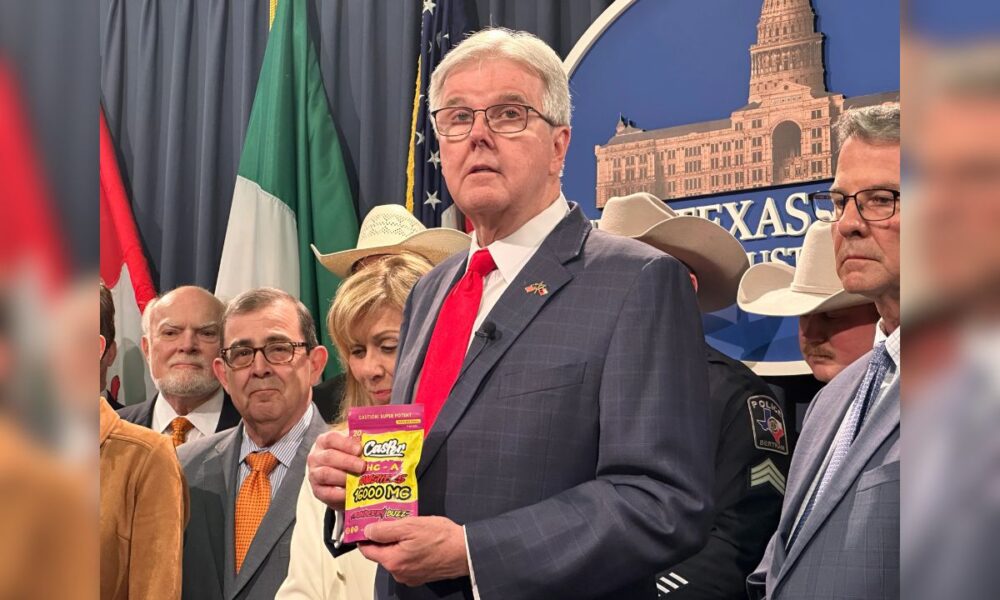(Texas Scorecard) – A proposal to crack down on the sale of THC products in Texas has been revived in the Texas Senate—with supporters arguing it’s a necessary step to stop what they call a shadow recreational marijuana market and opponents warning it will shutter small businesses across the state.
Senate Bill 5, authored by State Sen. Charles Perry (R–Lubbock), would ban the production, sale, and possession of consumable marijuana products that contain any cannabinoids other than Cannabidiol (CBD) or (CBG). Substances marketed as delta-8, delta-9, delta-10, THCA, and THC-O would be outlawed.
During a committee hearing on the bill just two days into the special session, Perry made it clear that the legislation is intended to remove most THC from stores.
“This bill is intended to effectively regulate and remove some of the products that are currently on the market,” he said. “The product is plain and simply illegal.”
Perry also noted that the bill would allow the continued sale of hemp seed derivatives like hemp oil and protein powder, which he said are federally recognized and not intoxicating. But he argued that the bulk of the products found in retail stores today were never intended under the 2019 hemp legalization law and have instead flooded the state under a false sense of legality.
“We’ve literally allowed this industry to spring up underneath our feet, screaming it’s legal—and it’s not,” he said.
While Perry initially referred to the bill as a regulatory measure, Lt. Gov. Dan Patrick issued a press release during the hearing that more directly framed the bill as a “ban on THC.” The messaging is part of a broader public rift with Gov. Greg Abbott, who vetoed a similar bill last month, citing concerns about overregulation. In response, Patrick accused the governor of wanting to legalize recreational marijuana.
Abbott has denied this characterization, instead saying he wants to ban the product completely for children and eliminate “intoxicating hemp products” across the board.
“The only hemp product that’s going to be out there is nonintoxicating hemp, which is below three milligrams of THC,” Abbott told Community Impact during an interview on Tuesday.
Though Abbott reportedly said he had not read the new legislation, that would largely be in line with the proposal currently moving through the Senate.
Support for the bill came from law enforcement. Chambers County Sheriff Brian Hawthorne, testifying on behalf of the Sheriffs’ Association of Texas, said the current hemp market amounts to a recreational drug pipeline.
“Since 2019, we’ve allowed Texas to become a de facto recreational drug state,” Hawthorne told the committee. “All of us in government, state leadership, state regulatory agencies, law enforcement and prosecutors, we all have failed to prevent the proverbial camel nose from peeking under the tent. The camel we fight against is recreational marijuana under the false label of hemp.”
Hawthorne shared examples of retail products sold in Texas, including marijuana flower and a substance known as “gas station heroin,” arguing that much of it is already federally illegal. He said sheriffs across the state would prefer no bill pass at all rather than see legislation that doesn’t include a strong THC prohibition.
But not everyone agreed. Andrew Dickerson, a district manager for a statewide chain of vape shops, testified that the bill would wipe out the main source of revenue for his business and leave hundreds out of work.
“We have over 400 employees … It will lead to layoffs. It will lead to several of our locations, if not the majority of them, closing down,” said Dickerson, whose stores operate under the name Rock N Roll It.
He said his stores serve veterans, first responders, and other adults looking for relief from stress and pain—but agreed that regulations and age limits are appropriate.
“Nine times out of 10, you’re talking about normal Texas citizens—overage adults—who are coming in for a little bit of stress relief, something that can help them get through the day,” he said.
Under SB 5, manufacturers would face $10,000 licensing fees per location, while retailers would pay $20,000 annually per location to register with the state. Each product would also have to be individually registered, labeled with a QR code, and approved before being sold. Criminal penalties would apply to anyone possessing or selling banned products, including a Class C misdemeanor for possession and a third-degree felony for manufacturing or distribution.
The State Affairs committee unanimously approved the legislation. A vote on the bill is expected soon in the Senate.


